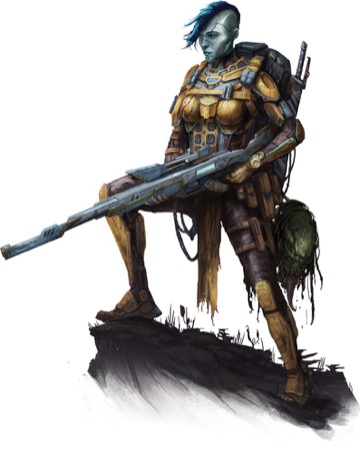Starfinder Character Themes
Friday, June 9, 2017
In Starfinder, every player character has a theme, which represents a focus for the character beyond those determined by race, class, and skill and feat selections. In many ways a theme is a description of the character's place in society based on what interests them and what kinds of tasks they undertake. While a theme may represent a job or role within a broader culture, it can also be a result of a character's background, upbringing, training, or mystical destiny.
Each theme has a set of benefits when first selected, including a +1 bonus to one specific ability score and a skill-based benefit. Each theme grants additional special benefits that reflect major aspects of that theme at 6th, 12th, and 18th levels. None of the abilities are limited to any specific character class, race, or type of character. Conceptually, themes are designed to give the same kind of specialization that traits and favored class bonuses do in Pathfinder, but are faster and easier to select (no theme has any kind of prerequisite or limitation on who can take it) and rather than many tiny character adjustments, each theme focuses on 4 noteworthy adjustments over a character's career. Think of it as one extra dial you can turn to customize your character, giving the same class and race a dramatically different feel—a vesk soldier with the icon theme might be a celebrity gladiator, while one with the priest theme might be a chaplain of Damoritosh the Conqueror.
There are nine themes in the Starfinder Core Rulebook, with a tenth option—"themeless"—for characters with a specific concept that they don't feel is a good match for any of the currently extant themes. The themes are intentionally kept fairly broad, with the names functioning as descriptive titles rather than hard limitations on what kind of character might take each theme. You can see a little of how themes can help you hone in on a particular character concept in the character build examples presented at the end of each class. Take the outlaw theme, for example: in just those few class build examples, we show you how the same outlaw theme can make an envoy into a fast-talking scoundrel, a mechanic into a saboteur, an operative into either a hacker or a thief, a solarian into a disgraced outcast, a soldier into a freelance sniper, and so on.
The nine themes (and the themeless option) are described briefly below.
Ace Pilot: Thanks to steady hands and nerves of steel, you are skilled at operating starships and other vehicles.
Bounty Hunter: Almost nothing will stop you from tracking down your quarries and returning them dead or alive.
Icon: You are a popular and respected celebrity within the bounds of colonized space.
Mercenary: You are a well-trained soldier of fortune who works well with your companions in battle.
Outlaw: Whether you're guilty or not, somebody wants to see you behind bars—or worse.
Priest: Your unshakable devotion to a philosophy or religion forms the core of your personality.
Scholar: As an academic, you have a broad knowledge base and a thirst to expand it.
Spacefarer: You live your life among the stars, seeking new worlds to explore and yearning for the next adventure.
Xenoseeker: As you travel outside of Pact Worlds space, you strive to make first contact with alien life forms.
Themeless: You don't fit neatly into any of the above categories, or you see yourself as a blank slate.
The abilities gained by each theme at 1st, 6th, 12th, and 18th level are useful and appropriate to the theme, but not so overpowering as to be a mandatory part of any effective character build. Below are examples of a few theme abilities—the 1st level ability gained by themeless characters (general knowledge), and the 6th level ability gained by the xenoseeker (quick pidgin).
General Knowledge (Themeless, 1st): You gain a class skill of your choice when you create a themeless character. You also gain an ability adjustment of +1 to any ability score you choose.
Quick Pidgin (Xenoseeker, 6th): If you don't share a language with creatures you encounter, you and the creatures can spend 10 minutes attempting to converse (if they are willing), after which you attempt a DC 25 Culture check. If you succeed, you formulate a simple pidgin language that allows basic communication. You can use the pidgin language with those specific creatures only, but you gain a +2 bonus to Culture checks to create a pidgin language with similar creatures that speak the same language.
Owen KC Stephens
Developer
We have updated our Privacy Policy.
Paizo.com uses cookies. You can block paizo.com from using cookies within your browser settings, but doing so will hinder site functionality.
More information can be found in our Privacy Policy.

